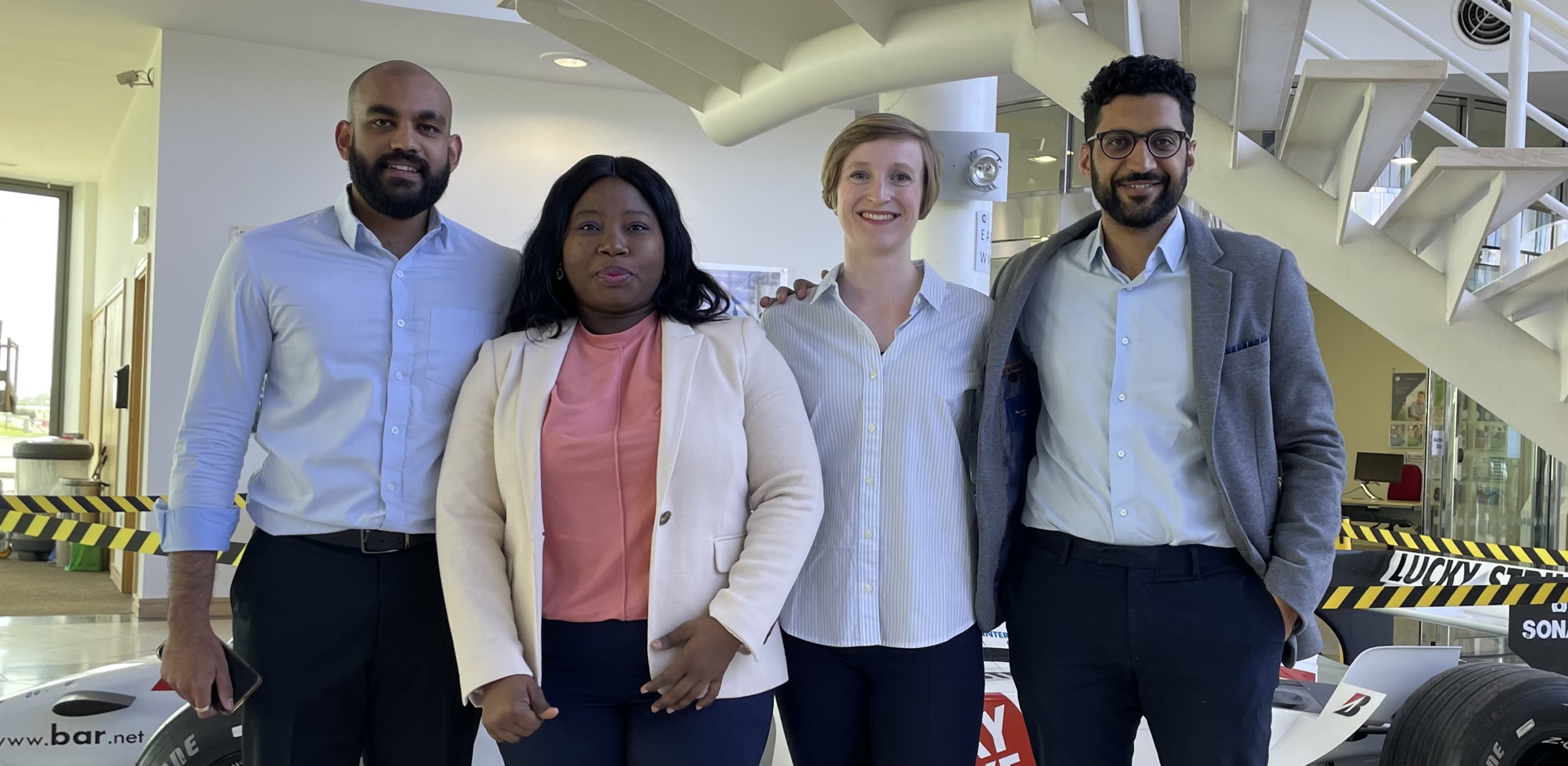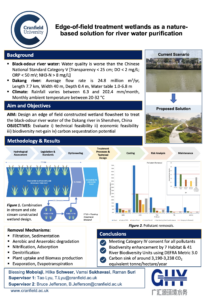Our group project experience designing a nature-based solution to treat polluted river water
07/07/2022

What was your group project?

The group project on ‘Edge-of-field treatment wetlands as a nature-based solution for river water purification’ was an interdisciplinary project assessing water quality, carbon sequestration, and biodiversity net-gain. Our group consisted of four people, three from the Water and Wastewater Engineering MSc, and one from the Advanced Water Management MSc. The ten-week project was sponsored by GHY Environment Water Limited from Shenzhen, China, and supervised by Dr Tao Lyu, Lecturer in Green Technologies and Professor Bruce Jefferson, Professor of Water Engineering at the Cranfield Water Science Institute.
Who were the group members?
Blessing Mobolaji
I am a biochemist with twelve years plus experience in water treatment from Nigeria, studying for a Water and Wastewater Engineering MSc at Cranfield University on the Commonwealth Shared Scholarship. I am passionate about water quality for improved public health and sustainable development, which is why I wanted to learn more about the multi-benefits of nature-based solutions. After this programme, I am planning to proceed with a PhD to bridge the gap between water research and policy making.
Hilke Schweer
I am an Advanced Water Management MSc student from Germany holding the IWA & Cranfield Excellence Scholarship. Previously, I worked at a start-up which developed a low-cost smart water quality monitor where I analysed water quality data. This group project gave me a unique exposure in measuring and treating polluted river water. It was a great opportunity to work on nature-based solutions and learn about engineered approaches for environmental remediation.
Vamsi Sukhavasi
Following a BEng. in Mechanical Engineering from Mahindra Ecole centrale, India, I am currently pursuing a Water and Wastewater Engineering MSc at Cranfield University. With more importance being given to nature-based solutions for water treatment, this group project was an invaluable experience for my upcoming job as a Graduate Process Engineer at Mott MacDonald in September.
Raman Suri
I am a Water and Wastewater Engineering MSc student from the UK and this group project was a great opportunity to research treating polluted river water. The topic is very close to my heart and one of the reasons I became interested in water engineering. During my studies, I have had the chance to explore the stages and various processes involved in water treatment. Currently, my ambition is to follow a research pathway with a focus on membrane and filtration processes which will enable me to reach my goal to become a professional water engineer.
How did you find working as a group?
We worked very well together as a team and shared a healthy work dynamic. We considered ourselves lucky to be in a group with each other. All of us had interacted beforehand from the various social activities at Cranfield and the group project made our friendship even stronger.
How did you structure your time as a group?
We had weekly meetings with our supervisor and at least three group meetings every week. These meetings led to a high engagement of all the group members and to a transparent working environment. There was successful co-ordination throughout in terms of meeting our interim project deadlines during the full ten weeks. Each week, the leadership roles were rotated to give everyone experience of being the chairperson or the secretary.
Did you experience any difficulties during the group project?
Inevitably some conflicts and issues did occur over the ten weeks but as a group we were overall very supportive of each other. At the start of the project, we all sat down to discuss our individual strengths and weaknesses which helped us identify both to ourselves and our group which core competencies we wanted to improve on during the project. We were able to reflect on our progress during a peer review feedback survey halfway through the project and a self-reflective write-up at the end.

What else did you have to do for your group project?
The group project consisted of a written report, poster and presentation. In our case, the written element was in the style of a technical consulting report. The presentation gave a complete overview of our work, while the poster was designed to communicate scientific information to a general audience.
How did the group project presentation go?
The professional setting at the ‘Cranfield Studio’ where the presentations were recorded and broadcast to a live audience was a very good experience. All of us presented and answered questions from the panel and the feedback from the markers and audience was positive.
What tips and advice would you give to next year students?
Be open, curious and don’t be afraid to ask for help whenever needed. Take the opportunities that you search for and that present themselves to you at Cranfield. Enjoy your time as a graduate student!
Categories & Tags:
Leave a comment on this post:
You might also like…
Company codes – CUSIP, SEDOL, ISIN…. What do they mean and how can you use them in our Library resources?
As you use our many finance resources, you will probably notice unique company identifiers which may be codes or symbols. It is worth spending some time getting to know what these are and which resources ...
Supporting careers in defence through specialist education
As a materials engineer by background, I have always been drawn to fields where technical expertise directly shapes real‑world outcomes. Few sectors exemplify this better than defence. Engineering careers in defence sit at the ...
What being a woman in STEM means to me
STEM is both a way of thinking and a practical toolkit. It sharpens reasoning and equips us to turn ideas into solutions with measurable impact. For me, STEM has never been only about acquiring ...
A woman’s experience in environmental science within defence
When I stepped into the gates of the Defence Academy it was the 30th September 2019. I did not know at the time that this would be the beginning of a long journey as ...
Working on your group project? We can help!
When undertaking a group project, typically you'll need to investigate a topic, decide on a methodology for your investigation, gather and collate information and data, share your findings with each other, and then formally report ...
From passion to purpose: My journey at the Pinnacle of Aviation
By: Sultana Yassin Abdi MSc Air Transport Management, Current Student Born and raised in the vibrant landscape of the UAE, with roots stretching back to Somalia, my life has always been ...






